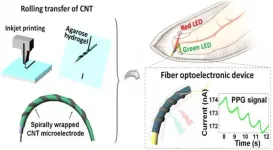(Press-News.org) New energy tariffs could leave people on bad deals even worse off despite the potential benefits for everyone, research has found.
The study, led by the University of Leeds, found new types of energy contracts designed for a low carbon future could benefit all types of customer, with opportunities to sell excess energy from solar panels or incentives for using energy at off-peak times.
However, many people were unlikely to choose them because they were disengaged from the energy market, didn't trust energy companies, or already feel satisfied with their current tariffs. Those likely to adopt them first are younger, with higher incomes and higher education.
Energy companies are already starting to offer these contracts, but there has been little understanding of how much consumer demand there is for these new models, and how consumers may be affected by them.
The study, carried out by a team that included researchers from UCL and University of Waikato, New Zealand, shows consumers who already trust the energy market, with higher incomes and positive attitudes towards technology, are likely to do well out of contracts that help energy system decarbonisation.
However, consumers in lower-income and lower education groups may be too cautious to gain the benefits of early adoption, be too disinterested in switching supplier, or find the market too untrustworthy to engage with. This could lead to them defaulting to more expensive, less tailored, or even more risky contracts.
Principal investigator Dr Stephen Hall, from Leeds' School of Earth and Environment, said: "These new energy contracts are really important for low-carbon energy systems, and are already appearing on price comparison sites.
"Our work shows only some consumers find these new types of energy supply attractive, and others cannot access them because they rent their home or might not be able to afford cutting edge technologies like electric cars and home batteries. This means some consumers could get left behind because they cannot or will not engage with new tariffs.
"The energy market tends to preference affluent and active consumers, while often exploiting inactive consumers who are usually in lower-income groups.
"The findings of this research suggests that gap is likely to widen without intervention because smarter and more flexible tariffs worsen the divide between who benefits from the market, and who loses out."
Researchers set out to explore how likely customers were to choose new types of energy contracts when presented with a range of offers.
Some 2,024 customers were presented with five new business models and asked and asked a series of questions about them, including their likelihood to sign up to them if they were available today.
The models included options such as longer 10-year contracts with energy efficiency measures, allowing for utilities to control some energy services in the home, making the switching decision automatic, and trading their own excess green electricity.
From the responses they identified four consumer segments based on how engaged they were with their current electricity and gas suppliers, their appetite for choosing new business models and their reasons for wanting certain types of products. The segment with the highest appetite for new models was also the smallest, suggesting that they may have a limited consumer base to expand into.
This group was made up of people who had the highest income, tended to be younger and keen on adopting new technologies, they also had the highest level of education.
The other three segments were less likely to choose new business models because they were cautious in their adoption of new technology, didn't think the new tariffs would offer a better deal, had significant trust issues in the market, or were too disengaged to switch supplier regularly.
The report, Matching consumer segments to innovative utility business models, is published in Nature Energy.
The findings suggest there is potential for further innovation in the energy market, but at the same time, the customer base may be more limited than is generally expected.
There is also the risk of a further loss of trust in the energy market as tariffs become more complex and winners and losers more obvious.
Professor Jillian Anable, who led the statistical analysis, said: "Our analysis has revealed a rich set of segments which shows that there is no average domestic energy consumer.
"Energy companies are going to have to work hard to tailor their products and their marketing in ways that cut through the disengagement, complexity and mistrust experienced by people with respect to their home energy consumption."
Dr Hall said: "Our research shows there is some demand for innovative energy contracts, but there is a disconnect between the groups that find them attractive and their ability to sign up to them. Energy companies should target them directly and give them the means to act on their preferences.
"As the market diversifies and contracts become more complex, consumers may decide to stick with what they know, introducing more complex consumer risks. The challenge for regulatory institutions is to recognise these risks and evolve the regulatory model of the retail market."
INFORMATION:
Picture: Piqsels
Further information
For media enquiries contact University of Leeds press officer Lauren Ballinger via l.ballinger@leeds.ac.uk
University of Leeds
The University of Leeds is one of the largest higher education institutions in the UK, with more than 38,000 students from more than 150 different countries, and a member of the Russell Group of research-intensive universities. The University plays a significant role in the Turing, Rosalind Franklin and Royce Institutes.
We are a top ten university for research and impact power in the UK, according to the 2014 Research Excellence Framework, and are in the top 100 of the QS World University Rankings 2021.
The University was awarded a Gold rating by the Government's Teaching Excellence Framework in 2017, recognising its 'consistently outstanding' teaching and learning provision. Twenty-six of our academics have been awarded National Teaching Fellowships - more than any other institution in England, Northern Ireland and Wales - reflecting the excellence of our teaching.
http://www.leeds.ac.uk
Follow University of Leeds or tag us in to coverage: Twitter Facebook LinkedIn Instagram
Advances in wearable devices have enabled e-textiles, which fuse lightweight and comfortable textiles with smart electronics, and are garnering attention as the next-generation wearable technology. In particular, fiber electronic devices endowed with electrical properties, while retaining the specific characteristics of textiles, are key elements in manufacturing e-textiles.
Optoelectronic devices are generally constructed using layers of semiconductors, electrodes, and insulators; their performance is greatly affected by the size and structure of the electrodes. Fiber electronic components for e-textiles need to be fabricated on thin, pliable threads; since these ...
The agricultural cultivation of the staple food of rice harbours the risk of possible contamination with arsenic that can reach the grains following uptake by the roots. In their investigation of over 4,000 variants of rice, a Chinese-German research team under the direction of Prof. Dr Rüdiger Hell from the Centre for Organismal Studies (COS) of Heidelberg University and Prof. Dr Fang-Jie Zhao of Nanjing Agricultural University (China) discovered a plant variant that resists the toxin. Although the plants thrive in arsenic-contaminated fields, the grains contain far less arsenic than other ...
WASHINGTON -- About 17 years ago, J. Martin Laming, an astrophysicist at the U.S. Naval Research Laboratory, theorized why the chemical composition of the Sun's tenuous outermost layer differs from that lower down. His theory has recently been validated by combined observations of the Sun's magnetic waves from the Earth and from space.
His most recent scientific journal article describes how these magnetic waves modify chemical composition in a process completely new to solar physics or astrophysics, but already known in optical sciences, having been the subject of Nobel Prizes awarded to Steven Chu in 1997 and Arthur Ashkin in 2018.
Laming ...
Travellers looking to book a hotel should trust their gut instinct when it comes to online reviews rather than relying on computer algorithms to weed out the fake ones, a new study suggests.
Research, led by the University of York in collaboration with Nanyang Technological University, Singapore, shows the challenges of online 'fake' reviews for both users and computer algorithms. It suggests that a greater awareness of the linguistic characteristics of 'fake' reviews can allow online users to spot the 'real' from the 'fake' for themselves.
Dr Snehasish Banerjee, Lecturer in Marketing from the University of York's Management School, said: "Reading and writing online reviews ...
A UK wide survey of 2252 adults, carried out five weeks into the first lockdown revealed 95% of those who took part were following lockdown restrictions. Of that 95% more than 80% reported finding it challenging. Adjusting to changes in daily routines, and mental and physical health struggles were the most common challenges faced by participants. Women and adults under the age of 55 were most likely to report experiencing challenges.
The research, 'What challenges do UK adults face when adhering to COVID-19-related instructions? Cross-sectional survey in a representative sample'*, was published in the journal, Preventive ...
TAMPA, Fla. - Advanced melanoma is one of the deadliest types of cancer, with a 5-year survival rate of only 27% for patients with distant metastases. Recent advances in targeted therapies and immunotherapies have greatly improved patient prognosis; however, many patients eventually develop resistance and disease recurrence. Researchers at Moffitt Cancer Center are investigating how to combine and sequence new therapies to improve survival. In a new article published in Cancer Immunology Research, the Moffitt team shows that sequential administration of immunotherapy followed by targeted therapy prolongs anti-tumor responses in preclinical models and may be a potential ...
A foundational study conducted by scientists at the National Renewable Energy Laboratory (NREL) shows for the first time that white-rot fungi are able to use carbon captured from lignin as a carbon source.
The research confirms a hypothesis from Davinia Salvachúa Rodriguez, the senior author of a newly published paper. Until now, scientists were unsure whether white-rot fungi--the most efficient lignin-degrading organisms in nature--actually consume the products generated from breaking down lignin.
"What we have demonstrated here is that white-rot fungi can actually utilize lignin-derived aromatic compounds as a carbon source, which means they can eat them and utilize them to grow," Salvachúa said. "That is another strategy for carbon sequestration in ...
Inherited retinal dystrophy is a common cause of blindness, with as many as two million people suffering from the disorder globally. No effective treatment is available for retinal dystrophies. Gene therapy is expected to offer a solution, but developing such therapies is possible only when the genetic cause of the disease is known. Related mutations have been identified in more than 70 genes so far, but the genetic background of the disease remains unknown in as many as half of the patients.
"Retinal dystrophy has been described in over 100 dog breeds, with related investigations helping to identify new genes associated and pathogenic mechanisms with blindness across different ...
In a recent collaborative study led by the University of Maryland (UMD), researchers find that consumers tend to buy something less fuel efficient than they normally would for their second car after springing for an eco-friendly vehicle. While this sounds like an all-too-logical conclusion, the study reports a 57% reduction in the benefits of driving your fuel efficient car for carbon emissions purely based on the purchase of your second vehicle. Since about three-quarters of cars are purchased into multi-car households, these findings could have major implications for carbon emissions, and especially for the design of carbon mitigation programs like Cash-for-Clunkers and Corporate Average Fuel Economy (CAFE) standards that aren't taking ...
Philadelphia, March 2, 2021 - Researchers from the Mitochondrial Medicine Frontier Program at Children's Hospital of Philadelphia (CHOP) have demonstrated how one combination of therapies may be beneficial for patients with mitochondrial respiratory chain disorders. This preclinical research paves the way to develop more tailored treatment options for patients with inherited mitochondrial disease and acquired energy disorders. The findings emphasize the importance of rational therapeutic modeling to target specific cellular deficiencies and provide proper cellular nutrition as an effective means to manage mitochondrial disease.
The findings were published online ...





